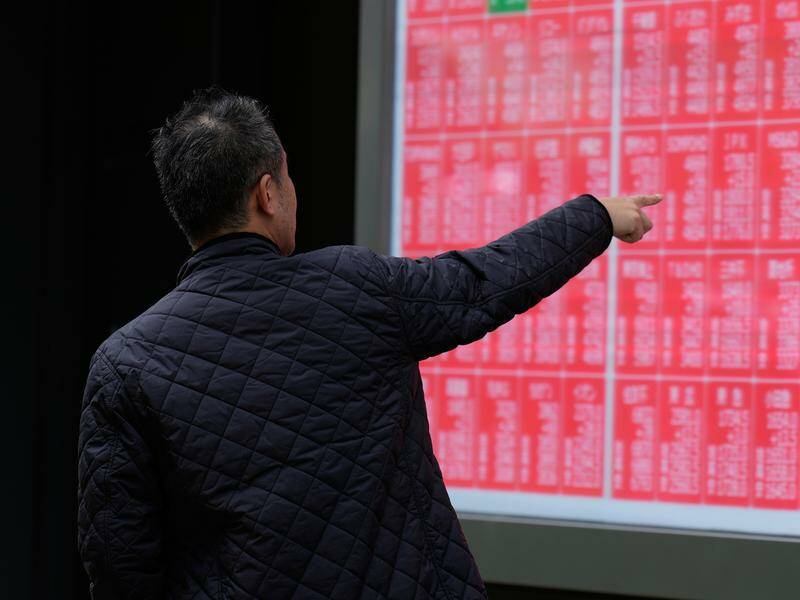
Investor sentiment took a significant hit this week as concerns over the sustainability of the artificial intelligence (AI) stock rally combined with disappointing trade data from China. The technology-heavy stock markets are set for their largest weekly decline in seven months, reflecting a broader unease among traders regarding the potential for a market correction in the AI sector.
The STOXX benchmark, which tracks 600 large European companies, declined by 0.17 percent in early trading on Friday. In contrast, US markets appeared poised for a slightly positive open, with S&P 500 and Nasdaq 100 futures both rising by 0.3 percent. This follows a substantial 1.9 percent drop for the Nasdaq on Thursday, bringing its weekly decline to 2.8 percent. If this trend continues, it would mark the index’s largest weekly fall since April when tariffs introduced by the Trump administration started to affect market dynamics.
In a troubling sign for the global economy, China’s exports fell by 1.1 percent in October, marking the worst performance since February. This decline underscores the challenges faced by the world’s second-largest economy, particularly its dependence on American consumers. Chinese indices reflected the downturn, with both the blue-chip CSI300 Index and the Shanghai Composite Index closing 0.3 percent lower on Friday. Japan’s Nikkei index dropped 1.2 percent, resulting in a weekly loss of 4.1 percent, while South Korea’s KOSPI fell by 1.8 percent, marking its largest weekly decline since February at 3.7 percent.
The technology sector bore the brunt of the sell-off, with Softbank Group Corp experiencing a nearly 20 percent drop this week. Even the cryptocurrency market reflected this sentiment, as Bitcoin fell by 8 percent to approximately $101,525 (about $156,600 AUD).
Analysts noted that there has not been a single catalyst for the downturn in AI-related stock prices. Instead, market reactions suggest growing concerns over potential bubbles within the sector and questions about long-term profitability. For instance, Meta saw its stock price tumble after announcing substantial capital expenditures to develop AI data centers. Similarly, shares of Palantir Technologies fell despite the company surpassing earnings forecasts.
Herald van der Linde, head of equity strategy for Asia Pacific at HSBC, explained the shift in market sentiment: “Sometimes it’s a gradual shift in markets whereby an increasing number of people say: ‘Well, I’m well positioned … maybe I’ll take some money off the table.’ That might well be unfolding a little bit now.”
In the bond markets, investors flocked to safer assets, causing a rally that pushed benchmark 10-year US Treasury yields down by 6.4 basis points to 4.09 percent on Thursday. This movement followed a report from outplacement firm Challenger, Gray & Christmas, which indicated a surge in announced job cuts in October, further raising concerns about job security in the US. Yields remained steady on Friday, as such private surveys gained prominence during an ongoing US government shutdown that has halted official data publication.
The dollar index, which measures the currency’s strength against a basket of six major currencies, edged up 0.2 percent to 99.845. The euro remained relatively stable at approximately $1.1535 (around $1.78 AUD). The safe-haven yen was on track for a slight weekly gain of about 0.3 percent, trading at 153.46 per dollar.
Gold prices remained elevated, trading above $4000 (approximately $6170 AUD), driven by increased demand for safe-haven assets amid the government shutdown. However, gold prices are still shy of their record high of $4381.21 (about $6759 AUD) reached on October 20.
On the commodities front, oil prices experienced a modest recovery after three consecutive days of declines, driven by concerns over excess supply and weakening demand in the US. Brent crude futures rose by 69 cents, or 1.09 percent, to $64.05 (around $98.81 AUD) per barrel. Meanwhile, soybean prices headed for a weekly drop, with no substantial signs of large-scale orders from China, despite the US government stating that Beijing had committed to purchasing 12 million tons of soybeans by year-end.
Overall, the confluence of worries regarding AI stock valuations and disappointing trade figures from China has cast a shadow over global markets, prompting investors to reassess their positions heading into the final weeks of the year.






